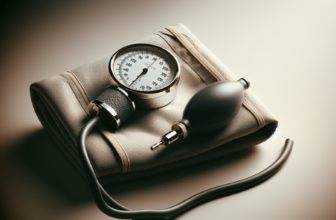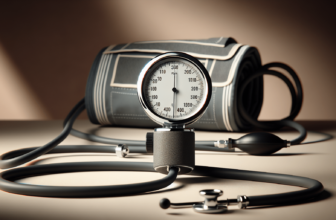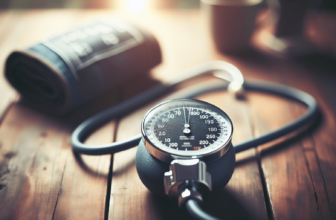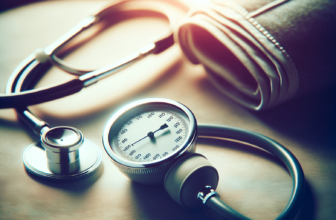Have you ever wondered about the impacts of high blood pressure on your health? Understanding this condition is crucial, as it can significantly affect your well-being. Let’s break it down together.
What is High Blood Pressure?
High blood pressure, also known as hypertension, is a common condition where the force of the blood against your artery walls is too high. This can lead to serious health problems if not managed correctly. It’s often referred to as the “silent killer” since many people may not even notice symptoms until it’s too late.
How is Blood Pressure Measured?
Blood pressure is measured using two numbers: systolic and diastolic.
- Systolic: This is the first number and measures the pressure in your arteries when your heart beats.
- Diastolic: This is the second number and measures the pressure in your arteries when your heart rests between beats.
For example, if your blood pressure reading is 120/80 mmHg, the systolic pressure is 120 and the diastolic pressure is 80.
What Are Normal Blood Pressure Levels?
Understanding what constitutes normal blood pressure can help you stay vigilant about your health. Here’s a simple breakdown:
| Blood Pressure Category | Systolic (mm Hg) | Diastolic (mm Hg) |
|---|---|---|
| Normal | Less than 120 | Less than 80 |
| Elevated | 120–129 | Less than 80 |
| Hypertension Stage 1 | 130–139 | 80–89 |
| Hypertension Stage 2 | 140 or higher | 90 or higher |
| Hypertensive Crisis | Higher than 180 | Higher than 120 |
If you think your blood pressure may be elevated, don’t hesitate to check it regularly.
Why Is High Blood Pressure Dangerous?
High blood pressure can lead to serious consequences. It strains your heart and blood vessels, increasing your risk of several severe health issues.
Heart Disease
Hypertension is a major risk factor for heart disease, which is the leading cause of death globally. The excessive pressure can cause your arteries to harden and thickening of the heart muscle, making it work harder than necessary.
Stroke
A stroke occurs when the blood supply to part of your brain is interrupted. High blood pressure can cause blood vessels in the brain to burst or become blocked, leading to a stroke.
Kidney Damage
Your kidneys play a critical role in filtering your blood. High blood pressure can damage the blood vessels in your kidneys, leading to kidney disease or even kidney failure.
Vision Loss
Hypertension can also affect your vision by damaging the blood vessels in your eyes, potentially leading to vision loss. Conditions like hypertensive retinopathy can occur, which can cause blurred vision or complete vision loss.
Aneurysms
An aneurysm is a bulge in a blood vessel caused by the weakening of the vessel wall. High blood pressure can contribute to the formation of an aneurysm, making it vulnerable to rupture, which can be life-threatening.
Cognitive Decline
There’s growing evidence that high blood pressure is linked to cognitive decline and dementia. It may affect how blood flows to the brain, leading to cognitive impairment over time.
What Causes High Blood Pressure?
Several factors can contribute to developing high blood pressure. Understanding them can assist you in managing your health better.
Lifestyle Factors
Your daily habits play a significant role in your blood pressure levels. Here are some key aspects:
- Diet: A diet high in salt, fat, and cholesterol can increase your blood pressure.
- Physical Activity: Lack of physical activity can lead to weight gain and high blood pressure.
- Weight: Being overweight or obese puts extra strain on your heart.
- Alcohol Consumption: Drinking too much alcohol can raise your blood pressure.
- Smoking: Every cigarette you smoke can temporarily raise your blood pressure and contributes to the hardening of your arteries.
Genetics
If you have a family history of hypertension, you may be more likely to develop high blood pressure yourself. It’s essential to monitor your levels if you have this genetic predisposition.
Age
As you get older, your risk of high blood pressure increases. Blood vessels naturally become stiffer over time, leading to higher readings. Regular check-ups can help catch any issues early.
Stress
Chronic stress can contribute to hypertension. Finding healthy ways to manage stress, such as exercise or meditation, can significantly benefit your overall health.
Symptoms of High Blood Pressure
High blood pressure often has no noticeable symptoms, which is why it can be so dangerous. However, some people may experience:
- Headaches
- Shortness of breath
- Nosebleeds
- Dizziness
- Flushing
If you experience any of these symptoms regularly, it’s a good idea to consult with a healthcare professional.
How to Manage High Blood Pressure
If you’ve been diagnosed with high blood pressure or are at risk, there are numerous ways to manage it effectively.
Lifestyle Changes
Making adjustments to your lifestyle can significantly impact your blood pressure. Here are some suggestions:
- Healthy Diet: Focus on a balanced diet rich in fruits, vegetables, whole grains, and lean proteins. The DASH (Dietary Approaches to Stop Hypertension) diet is especially beneficial for lowering blood pressure.
- Exercise: Aim for at least 150 minutes of moderate aerobic activity each week. Activities like walking, swimming, or cycling can be excellent options.
- Weight Control: If you’re overweight, losing even a small amount of weight can help reduce your blood pressure.
- Limit Alcohol: Try to limit your alcohol intake to moderate levels.
- Quit Smoking: Quitting smoking benefits your heart health as well as your overall well-being.
Monitoring Your Blood Pressure
Regularly checking your blood pressure is critical. You can measure it at home with a blood pressure monitor or during routine visits to your healthcare provider. This helps you keep track of your levels and see if changes are effective.
Medication
In some cases, lifestyle changes alone may not be enough to manage high blood pressure. Your doctor may prescribe medication, which can help lower your blood pressure effectively. Common types of medications include:
| Type of Medication | How It Works |
|---|---|
| Diuretics | Help your kidneys remove excess sodium and water, lowering blood pressure. |
| ACE Inhibitors | Block a hormone that narrows blood vessels, allowing them to relax. |
| Calcium Channel Blockers | Relax the muscles of your blood vessels and slow your heart rate. |
| Beta-Blockers | Reduce your heart rate and the heart’s workload. |
It’s essential to discuss any side effects or concerns with your healthcare provider when taking medication.
Natural Remedies for High Blood Pressure
In addition to medical treatments, there are natural remedies that may help control high blood pressure:
Garlic
Garlic has beneficial properties that can help lower blood pressure. Regular consumption may enhance cardiovascular health.
Omega-3 Fatty Acids
Found in fish and flaxseed, omega-3 fatty acids can reduce blood pressure levels and promote overall heart health.
Dark Chocolate
Moderate consumption of dark chocolate with high cocoa content can have a positive impact on cardiovascular health and lower blood pressure.
Hibiscus Tea
Drinking hibiscus tea may help reduce blood pressure due to its natural antioxidant properties.
However, always consult with your healthcare provider before starting any new remedies or supplements to ensure they are safe and suitable for your health status.
When to See a Doctor
If you suspect you may have high blood pressure or if you’re experiencing any symptoms, it’s advisable to see a doctor. Regular check-ups can help catch high blood pressure before it becomes a severe health issue.
Routine Screenings
For most adults, it’s good practice to have your blood pressure checked at least once every two years, and more frequently if you have risk factors.
Conclusion: Stay Informed and Proactive
Understanding high blood pressure and how it affects your health can empower you to make informed decisions about your well-being. By adopting healthy lifestyle choices and monitoring your blood pressure, you can take significant steps to manage this condition effectively.
Your health is in your hands, and making small changes can lead to significant improvements. Keep learning, stay alert, and prioritize your health; it is truly the best investment you can make!







